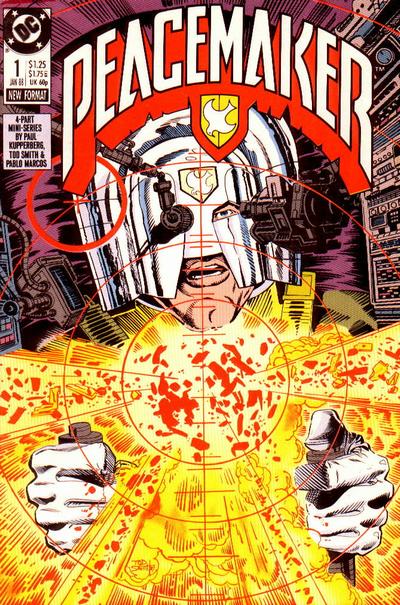The only superhero whose father was a Nazi death camp commandant he would follow in the footsteps of by massacring a village during the Vietnam War.

Created by Joe Gill and Pat Boyette for Charlton Comics in 1966, Peacemaker is Christopher Smith, “a diplomat who loves peace so much that he’s willing to fight for it”. That sort of made sense in the glamorous sixties spy thriller world he operated in. When Charlton went under in the 1980s, DC bought the rights to most of their Action Heroes, including him, as a present for their then editor in chief Dick Giordano, who had had the same role at Charlton in the sixties. Nothing was done with him until Paul Kupperberg brought him back in Vigilante for two stories in issues 36-38 and 42-43. Now he was still fighting for peace, but obsessed with terrorists and more than willing to kill whoever got in his way, which included the then Vigilante, who he killed the very first time they met.
Paul Kupperberg had taken over Vigilante from Marv Wolfman from issue 20. Under Wolfman Adrian Chase, the titular hero had not been a well man already, obssesed with his quest for vengeance agains the sort of criminals that had murdered his family, but Kupperberg upped the stakes drastically. Int he first part of Kupperberg’s run Chase quits being the Vigilante only to see two others take up the mask, the second one being the one who got murdered by Peacemaker, leading to Chase to return to the role. It doesn’t do his mental health any good and the series ends with issue 50 and his suicide…
Peacemaker’s appearances therefore fit in quite well, having become convinced that the souls of the people he killed reside in his helmet. His appearance also transforms the series from a straight out crime series to a more Tom Clancy-esque spy thriller one. Chase is outed as the Vigilante and becomes an agent of the same agency Peacemaker nominally works for. For some reason that was the sort of story Kupperberg found interesting at the time, both in his work on Doom Patrol a bit earlier and in Checkmate a bit later. Together with John Ostrander and Kim Yale on Suicide Squad he was one of the architects of the dark underside of the DC universe post-Crisis. Peacemaker fits right in.
Peacemaker 01 was the first of a four issue miniseries and the first time his new origin was told. Unlike previously, he no longer hears the voices of the people he killed, instead he hallucinates the presence of his father, clad in SS uniform, who constantly berates him for being weak and too kind, goading him on to be more ruthless and kill more. Both in the story itself and the briefings at the end of the issue we learn his father was an Austrian weapons merchant who in 1951 committed suicide after the Soviets revealed he had been a camp commandant responsible for the murder of 50,000 Jews. His mother took the young Christopher to America, her home country but he was already damaged by his father’s actions. Expelled from several schools for antisocial behaviour he joined the army at eighteen, just in time for ‘Nam, where he committed his own war crime in a My Lai style massacre. Sentenced to life in prison, under Nixon he was selected for a programme to create anti-terrorist supersoldiers, but with the chaos of his resignation the project was terminated and he just vanished, only to re-appear as the Peacemaker.
It’s an interesting origin to say the least, a bold move to make him the mentally ill war criminal son of a Nazi mass murderer. It’s far more interesting than the overall plot of the miniseries, some nonsense about a Fu Manchu like supervillain wanting to use terrorism to collapse the USSR and or most of Europe to create his own state. Even for that post-Watchmen grim ‘n gritty ear of DC deconstructionist superheroes this is way over the top. Somehow it worked though. Tod Smith’s art, inked by Pablo Marcos, helps here in that its rough, no-nonsense style suits the crudeness of the story. I’m not sure if you can call this series and this origin good, but at the very least it’s not dull.
No Comments